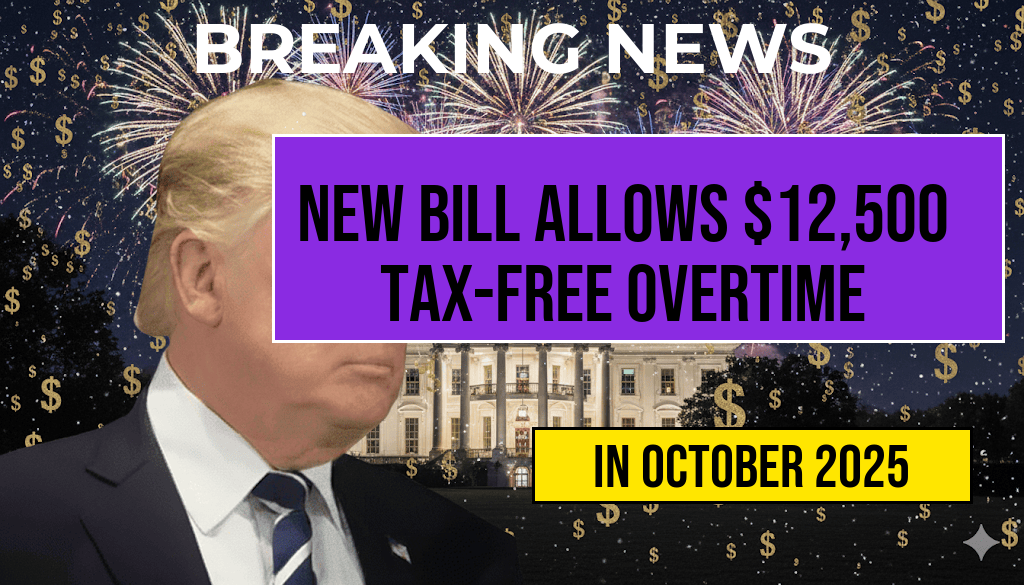In a significant move aimed at providing financial relief to workers, Congress has passed a new bill that protects up to $12,500 in overtime pay, enabling many employees to potentially receive a portion of their overtime earnings tax-free. This legislation is designed to support hard-working individuals who often find themselves putting in extra hours without adequate compensation. Under the new law, qualifying overtime pay may be exempt from federal taxes, allowing employees to retain more of their earnings. This change is expected to benefit millions of workers across various industries, particularly those in sectors where overtime is prevalent. As the law takes effect, many are eager to understand how it works and what it means for their paychecks.
Understanding the New Overtime Pay Bill
The bill, recently signed into law, alters the existing framework for overtime compensation, offering greater protection for employees who work beyond the standard 40-hour workweek. The key features of the legislation include:
- Increased Overtime Threshold: The new law establishes a higher threshold for overtime pay exemption, ensuring that more workers qualify for overtime benefits.
- Tax Exemption Cap: Employees can now potentially receive up to $12,500 of their overtime pay tax-free, significantly impacting their net income.
- Implementation Timeline: The changes will be phased in over the coming months, allowing employers time to adjust their payroll systems.
Who Benefits from the New Legislation?
This legislation primarily targets hourly workers who regularly accrue overtime. Professions likely to see the most impact include those in retail, healthcare, construction, and hospitality. The ability to receive tax-free overtime pay could lead to substantial financial benefits, especially for those working long hours to support their households.
How Much of Your Overtime Pay Could Be Tax-Free?
To understand the potential tax savings, it’s essential to consider how overtime pay is calculated. Typically, employees earn 1.5 times their regular hourly wage for hours worked beyond 40 in a week. The new law allows up to $12,500 of this overtime pay to be exempt from federal taxes, depending on individual earnings and hours worked.
| Regular Hourly Wage | Hours Worked (Weekly) | Overtime Hours | Gross Overtime Pay | Tax-Free Overtime (up to $12,500) |
|---|---|---|---|---|
| $20 | 50 | 10 | $300 | $300 |
| $25 | 55 | 15 | $562.50 | $562.50 |
| $30 | 60 | 20 | $900 | $900 |
Implications for Employers
Employers will need to adjust their payroll practices to comply with the new regulations. This includes re-evaluating employee classifications and ensuring that those eligible for overtime pay are properly compensated under the new law. While some businesses may view these changes as a challenge, others see it as an opportunity to enhance employee satisfaction and retention.
Additionally, companies must prepare for potential increases in operational costs due to the mandated overtime pay adjustments. However, the increased disposable income for employees could also lead to higher consumer spending, benefiting businesses indirectly.
Looking Ahead
The passage of this bill marks a pivotal moment in the ongoing discussion about workers’ rights and fair compensation. As employees begin to see the effects of these changes in their paychecks, advocacy groups will likely continue to monitor the legislation’s impact. With many workers still recovering from the financial strains of the pandemic, the ability to retain more of their earnings is a welcome development.
For more information on the implications of the new overtime pay bill, you can visit reputable sources such as [Forbes](https://www.forbes.com) and [Wikipedia](https://en.wikipedia.org/wiki/Overtime_pay). As these changes unfold, workers and employers alike will need to stay informed to navigate the new landscape of overtime compensation effectively.
Frequently Asked Questions
What is the new bill regarding overtime pay?
The new bill aims to protect up to $12,500 in overtime pay, allowing workers to potentially receive a portion of their earnings tax-free.
Who is eligible for the tax-free overtime pay?
Eligibility for the tax-free overtime pay under the new bill typically includes employees who work over a certain number of hours in a week and meet specific salary requirements.
How does the tax exemption for overtime pay work?
The bill allows employees to exclude up to $12,500 of their overtime earnings from taxable income, which can significantly reduce their overall tax liability.
Will this change affect all workers?
No, the changes primarily affect those who regularly receive overtime pay and meet the criteria outlined in the bill. Not all workers qualify for these benefits.
How can I find out how much of my overtime could be tax-free?
You can calculate your potential tax-free overtime by reviewing your overtime earnings and comparing them to the $12,500 limit set by the bill, or consulting with a tax professional.






